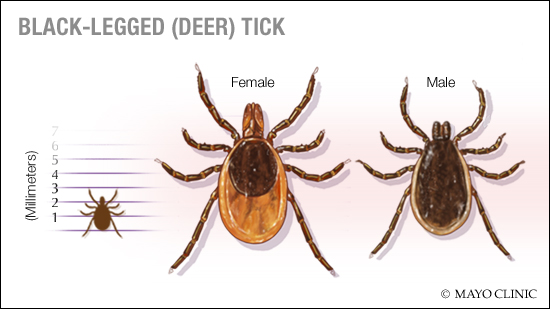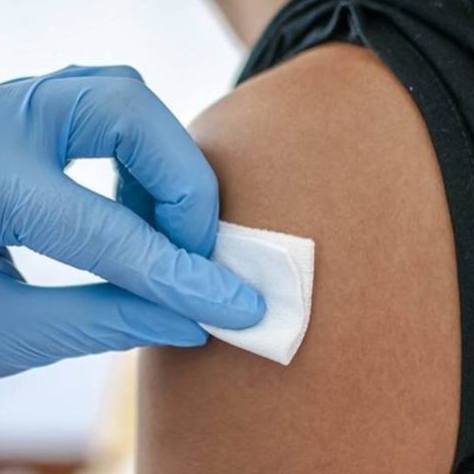
Tick season is underway in much of the U.S. This season, another tick-borne disease is on the list of concerns. That's because the Centers for Disease Control and Prevention has found a significant increase in reported cases of babesiosis(bah-bee-see-oh-sis) infection in eastern parts of the U.S.
"Babesiosis is another tick-borne disease that we hear about, in addition to Lyme disease, anaplasmosis and others," says Dr. Bobbi Pritt, director of the Clinical Parasitology Laboratory at Mayo Clinic. "Babesiosis is a parasitic disease transmitted by ticks. It's caused primarily by Babesia microti in the U.S., and that's transmitted by the same tick that transmits Lyme disease. The tick is called Ixodes scapularis, and it's commonly known as the black-legged tick, sometimes called the deer tick."
Dr. Pritt says most of the cases of babesiosis are reported in the Northeast and the upper Midwestern states of the U.S.
Watch: Dr. Bobbi Pritt talks about babesiosis and what you should know about the 2023 tick season
Journalists: Broadcast-quality soundbites along with b-roll video of ticks can be found in the downloads at the end of the post. Please courtesy: "Mayo Clinic News Network." Name super/CG: Bobbi Pritt, M.D./Microbiology/Mayo Clinic.
Symptoms
Symptoms of babesiosis infection may range from people not knowing they are infected to feeling like they have mild flu to life-threatening. Symptoms, if any, can start within a week after a bite from an infected tick.
Flu-like symptoms may include:
- Fever
- Chills
- Sweats
- Loss of appetite
- Nausea
- Fatigue
"They have a fever, chills, body aches and headache; however, some patients may experience more severe symptoms. And babesiosis can even be life-threatening," says Dr. Pritt.
If you feel you have been infected, seek medical care.
Compared to Lyme disease
Babesiosis and Lyme disease —the most common tick-borne disease — can be serious, says Dr. Pritt, but they have different manifestations.
“Lyme disease, if untreated, will disseminate throughout the body to the joints, and to the nervous system in the brain. Whereas babesiosis doesn't have that same pattern of dissemination. However, it can be life-threatening, particularly in patients that are immunocompromised or patients that don't have a functioning spleen. It can be fatal in those individuals," she says.
Reported cases of Lyme disease in the U.S. have continued to increase, says Dr. Pritt.
"We continue to see cases expand into other states along with the tick that spreads it, which is primarily Ixodes scapularis, the black-legged tick or otherwise known as deer tick. And with that tick is the diseases it carries, Lyme disease, as well as things such as the babesiosis, anaplasmosis and numerous other tick-borne diseases as well."
Lyme disease is perhaps one of the most well-known tick-borne illnesses. It is caused by bacteria transmitted through the bite of an infected black-legged tick. In the U.S., two types of tick-transmitted bacteria cause the illness: Borrelia burgdorferi and Borrelia mayonii. Lyme disease can be a serious, life-threatening disease, affecting many people.
Only a minority of tick bites lead to Lyme disease. The longer a tick remains attached to your skin, the greater the risk of infection. Infection is less likely if the tick is attached for less than 36 to 48 hours.
Prevention is the best medicine
Dr. Pritt says the best way to avoid getting sick with babesiosis, Lyme disease and other tick-borne infections during tick season is to avoid getting tick bites.
She recommends the ABCs of tick bite prevention:
- "A" stands for avoid. You want to avoid the areas where ticks are found and in the upper Midwest and Northeastern states where babesiosis is found. That means areas in the woods where there's brush, leaf litter and tall grasses.
- "B" stands for bug spray. Use it when you're outdoors and you think you're going to be exposed to tick bites or mosquito bites.
- "C" stands for cover up. Wear protective clothing. If you have clothing over your skin, then the ticks won't be able to bite your skin.
The Centers for Disease Control and Prevention recommends using a bug spray that either contains DEET 30% or picaridin. You also could use a bug spray that has oil of lemon eucalyptus in it. Those are all effective.
Mayo Clinic Laboratories provides diagnostic tests for vector-borne diseases like babesiosis and Lyme disease.
Related posts:
- BEAT the bite: Arm yourself against an emerging threat
- Mayo Clinic Minute: How to avoid ticks
- Mayo Clinic Minute: What to do if you are exposed to Lyme disease
For the safety of its patients, staff and visitors, Mayo Clinic has strict masking policies in place. Anyone shown without a mask was recorded prior to COVID-19 or recorded in an area not designated for patient care, where safety protocols were followed.
Related Articles







